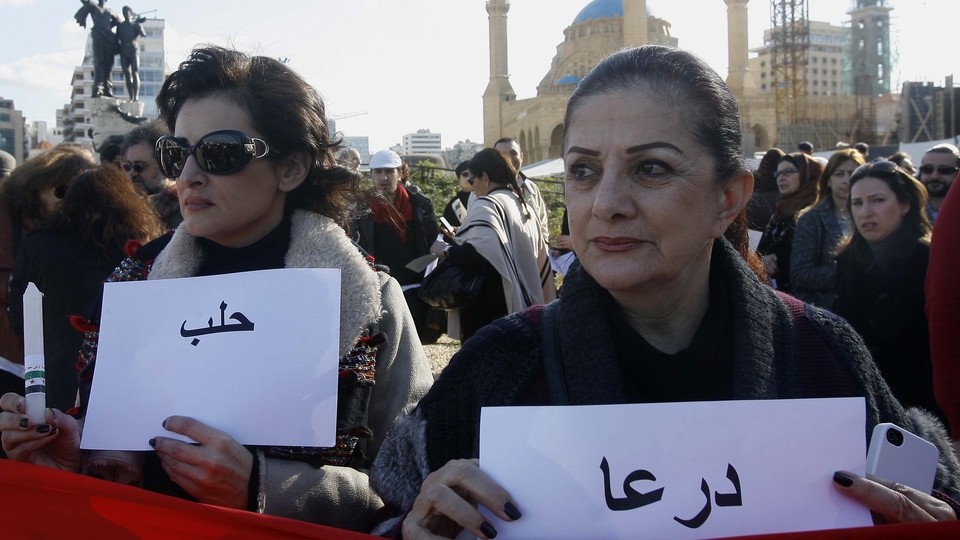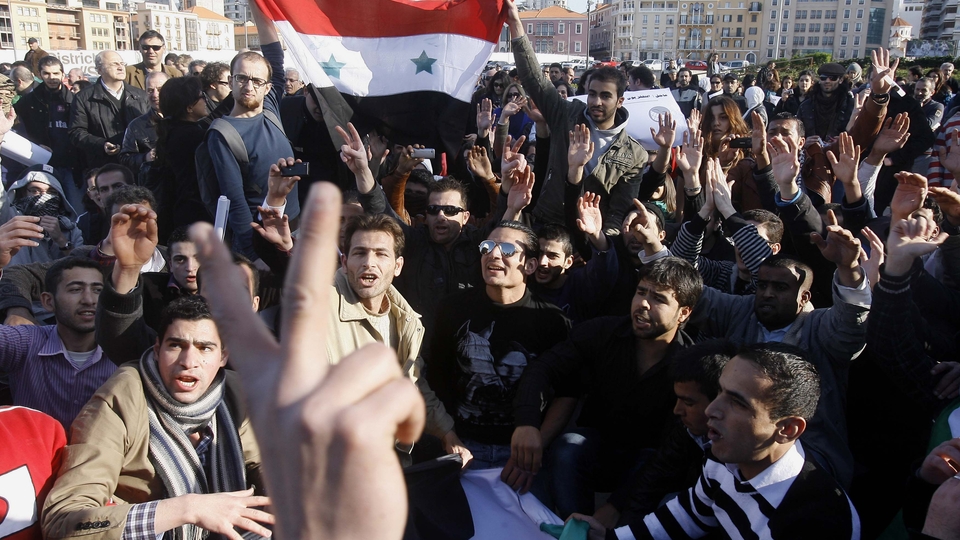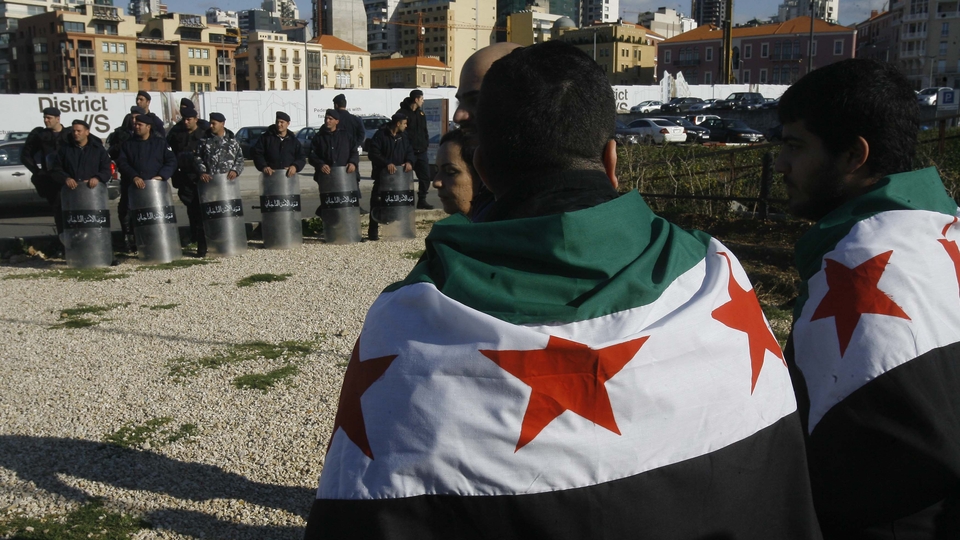Eleven Years On: Syrians in Lebanon and the Search for Political Agency
“Imagine Beirut, and Lebanon in general, as a candle. The wax has melted, the wick reduced, the flame dimmed… there is darkness. Not only darkness as the electricity goes out, but a deeper darkness enveloping everyone here.”
This is how Youssef al-Khodor, a Syrian poet in his late twenties, responded to the question of what Beirut meant to him today. He has been living in the city since 2007, when his family left their small town in the northeastern Syrian province of al-Hasakah in search of a better life.
Al-Hasakah is where, eleven years ago today, on January 26, 2011, 37-year-old Hassan Ali Akleh doused himself in gasoline and set himself on fire — one month after the self-immolation of street vendor Mohammed Bouazizi in Tunisia. Although Akleh’s act did not come to occupy as central a place as Bouzazizi’s in the predominant narratives of the Arab uprisings, that space in the Syrian context is reserved to the anti-Assad graffiti by children in Dara‘a, Akleh’s was among the first acts of refusal in 2011 Syria, followed by others in the lead-up to the country’s national uprising.
In the decade since the Syrian uprising transformed into war, Youssef has lived in neighboring Lebanon through two crises of historic proportions: the world’s largest refugee crisis of our present time and one of the worst economic crises of the century.
For Youssef, his family, and the almost 2 million Syrians living in Lebanon, the socioeconomic consequences have been dire. Nine out of 10 live in poverty, surviving on less than half the Lebanese minimum wage, with most dependent on cash assistance. Half of Syrian households in Lebanon are food insecure (double those in 2019), 93 percent are forced to borrow money for food, and almost 60 percent have a family member who requires medication. Syrian refugees face a COVID-19 death rate of more than four times the national average. Over half of Syrian children are not going to school, over a third of girls undergo child marriages, and child labor increased from 2 to 5 percent between 2019 and 2021.
Mounting discrimination, increasing restrictions on daily life, and a crackdown by Lebanese security on any organized attempts to resist these threats have left an already fragmented community unable to organize collectively to improve their condition.
As they navigate this overwhelming socio-economic landscape, the political one is no less forgiving. Mounting discrimination, increasing restrictions on daily life, and a crackdown by Lebanese security on any organized attempts to resist these threats have left an already fragmented community unable to organize collectively to improve their conditions.
Treated either as security threats or as objects of humanitarian assistance, Syrians in Lebanon are not constituted as political subjects. They find themselves stuck in “ping-pong politics,” facing reactionary responses and violence from the top and from below. Coupled with their disassociation from the political life of their country of origin, they have been stripped of political agency.
A Fragmented Community
“It is difficult to categorize Syrians in Lebanon as a refugee community because they have a multitude of experiences,” according to Sima Dardari, a Syrian anthropologist who worked with refugee communities in Lebanon and is currently based in Turkey.
“For example, an urban-rural divide was very common, and routinely brought up during discussions between Syrians. One of the most visible forms of privilege relates to if a person still has their Syrian passport, or better yet has another passport,” she noted in an interview with The Public Source.
“The immediate thing I recognize is that I have a Syrian passport and a foreign passport, both already give me a lot of privilege compared to other Syrians,” echoed Louai, a middle-aged medical relief worker in Lebanon who requested anonymity in order to speak freely.
“That passport gives me an advantage compared to other [Syrians] in Lebanon in terms of documentation and daily life, and the foreign passport gives me the ability to leave the country temporarily and return, which helps in just re-energizing myself mentally and physically,” said Louai.
Syrians in Lebanon vary widely in social class, privilege, immigration status, and housing situation, and they are scattered geographically. Around 20 percent live in nearly 6,000 informal tented settlements clustered in the north and the Beqaa Valley, the remaining absorbed into the urban environment. Only 16 percent hold legal residency permits.
They are also divided politically along the fault lines of the war. Given the dangers and challenges, comprehensive surveys on political preferences of Syrians in Lebanon are not available. Existing surveys show that most cling to the hope they will return to Syria, with many fearing repercussions from either the Assad regime or armed opposition groups, while others have no home to return to anymore.
Despite the differences separating them, what unites Syrians in Lebanon is “the experience of being Syrian in Lebanon,” according to Dardari. “There is an anxiety related to being discriminated against, and that anxiety does decrease by class but it still remains. There is stress when you speak with your accent, and what that implies, in addition to the restrictive laws and policies."

Two women hold vigil for the cities of Dara‘a and Aleppo during the one-year commemoration of the Syrian uprising. Martyrs’ Square, Beirut, Lebanon. March 17, 2012. (Marwan Tahtah/The Public Source)
A Crescendo of Discrimination and Disinformation
“It wasn’t until this past year, when I saw this video in which these two people came and burned a Syrian refugee camp, that I hated Lebanon,” the poet Youssef reflected when asked by The Public Source how he felt about life in Lebanon.
In December 2020, more than 300 Syrian refugees were forced to flee after their camp was set on fire by Lebanese residents following a dispute in northern Lebanon.
Between the summer and fall of 2021, 900 Syrian refugees were expelled from the village of Kawkaba and six Syrians were kidnapped by the Syrian embassy, in collaboration with Lebanese military intelligence.
In November, the municipality of Ras Baalbek issued restrictions on Syrians, including a curfew from 7 p.m to 6 a.m. and a limit on the daily wages that local employers can pay to Syrian workers.
“The hatred and xenophobia is increasing.… The [Lebanese] government can’t take care of all of the population, and will likely blame it on Syrians as scapegoats,” warned Dardari.
Indeed, calls by Lebanese politicians to forcibly return Syrians to Syria have gotten louder. Though xenophobic statements against Syrians were common among some political forces well before the Syrian crisis, between 2011 and 2014, the official Lebanese response to the crisis was to not have an official response (or what some have called “a policy of hiding its head in the sand”). In 2014, as the number of Syrian refugees in Lebanon hit 1 million, official policy acknowledged the crisis and introduced long-term and regulatory measures, perceived by human rights activists as an attempt to make refugees’ stay as administratively difficult and discriminatory as possible.
The basis for discriminatory policies has been the dubious claim that Syrian refugees are undermining the Lebanese economy.
[W]hat unites Syrians in Lebanon is “the experience of being Syrian in Lebanon...There is an anxiety related to being discriminated against, and that anxiety does decrease by class but it still remains." —Sima Dardari, anthropologist
For Cynthia Saghir, a socio-economic researcher, it is critical that we push back on the myths that feed these narratives. “We cannot talk about refugee contributions in Lebanon without talking about the problems that plague the economic system in Lebanon. It is very expensive to create a job in Lebanon in the first place.… Lebanon does not have the basic building blocks of what economic development needs,” she stated to The Public Source.
“There needs to be better awareness that if a forcible return of Syrians is carried out en masse, it would have its own negative repercussions on Lebanon,” she warned. “The cure they keep talking about will likely poison the body.”
According to academic Joseph Daher, the calls for returning Syrians to Syria mark a crescendo in an old score. “Regardless of the divisions among the Lebanese ruling class, Syrians have always been used as scapegoats. All [members of the ruling class] have attacked Syrians and instrumentalized racism towards Syrians for their aims,” he told The Public Source.
No Recourse
Of the 253 fatalities from the Beirut port explosion on August 4, 2020, more than 50 held Syrian passports. Syrian residents of the area lucky enough to be unscathed in the blast were especially vulnerable to the wave of evictions that followed given their fragile legal situation.
Like their Lebanese counterparts, the families of Syrian victims of the Beirut port explosion have received no justice from the Lebanese state. Additionally, Syrian families received no official compensation as dictated by Law 196/2020 because they were unable to afford the expense of producing the official documentation required. Some reported that the Lebanese army denied relief or aid on account that it was the responsibility of the United Nations High Commissioner for Refugees.
Families of Syrian victims have also received no support from the Syrian embassy nor any of the Syrian opposition groups.
A few victims’ relatives have resorted to participating in ongoing protests and sit-ins, such as Mona Jawesh, the mother of 20-year-old victim Rawan Misto.
Moreover, the Syrian victims are practically invisible in coverage of the explosion in Lebanon, except when it comes to laying blame, such as whether Syrian welders may have sparked the blast.

Syrian regime supporters disrupt the one-year commemoration of the Syrian uprising in Martyrs’ Square. Beirut, Lebanon. March 17, 2012. (Marwan Tahtah/The Public Source)
The Lebanese State’s Crackdown on Political Action
“When I was [in Lebanon] in 2011-2012, there were activities and political events for the Syrian revolution,” remembers Daher. But from the beginning, he added, Syrians “had to be careful in terms of how to operate.”
Daher was referring to the brief opening when Syrian activists in Lebanon were able to stage rallies at Martyrs’ Square in Beirut to mark the anniversaries of the uprising, organize in movements that agitated for positive change both inside Syria and for Syrians in Lebanon, host film screenings about the Syrian war and private discussions among Syrian activists, and gather in silent vigils for prisoners and the disappeared in front of the UN-ESCWA offices in downtown Beirut. This period also allowed for the establishment of Syrian-led NGOs like Sawa for Syria (now Sawa for Development and Aid) and Basmeh & Zeitooneh.
Then, in 2016-17, circumstances radically changed. “A policy of crushing any Syrian activity” went into full effect, according to Daher.
One of the last public acts of political activity took place in July 2016, when around 200 people marched against anti-Syrian discrimination.
The closure of space for political action came as the Syrian war witnessed more aggressive military interventions by Lebanese political parties, vicious battles along the Lebanese-Syrian border, and a series of explosions by anti-Assad groups in towns and cities across Lebanon.
Using a “War on Terror” framework, the Lebanese security apparatus became more repressive towards organizations dedicated to issues affecting Syrians. The “securitization of Syrian refugees” meant that Lebanese authorities tolerated only strictly humanitarian or relief activities.
The transformation was epitomized when the Socialist Forum, a now defunct radical leftist political party established in Lebanon in 2011, attempted to organize a protest in July 2017 over the death of four Syrian refugees detained by the Lebanese security forces, and in response to xenophobic discourse surrounding the upcoming Battle of Arsal.
Immediately, the protest was banned, activists of the Socialist Forum faced death threats, and some supporters and journalists were arrested. A hate and disinformation campaign was also directed towards them, with little to no backing from allied organizations.
A statement by the Socialist Forum about the incident noted: “Despite the fact that the Socialist Forum has organized numerous solidarity meetings with Syrian refugees over the years, this is the first time that the call for a sit-in has received so many open threats. We believe that this incitement is aimed at paving the way for an all-out war in Arsal, and imposing a deal with the Syrian regime within the framework of a settlement that would require the forcible transfer of Syrian refugees to so-called “safe-zones” within Syria.”
Rekindling the Political Flame?
Since the 2017 crackdown by Lebanese security services, the only public display of political activity by Syrians in Lebanon was voting in the Syrian presidential elections in May. Thousands of Syrian residents of Lebanon were bused by the Syrian regime and its allies to the Syrian embassy to vote, with some of the voters being attacked by a crowd of Lebanese protesters.
The only way to turn the tide, to rekindle political activity among Syrians in Lebanon, is through “a radical change from below in terms of the socio-political system in Lebanon,” argued Daher.
“Throughout all these years, I never cared to pay attention to politics. It didn’t seem to be necessary to me. But after all that’s happened, I find myself inescapably drawn to the political question. It seems more and more likely the only answer." —Youssef al-Khodor, Syrian poet
He pointed to the fact that during the first six months of Lebanon's October 2019 uprising, grassroots movements challenged anti-Syrian discourse, with such actions dissipating when the movement weakened. “There is a correlation, this shows that it’s not impossible.”
Daher added that it also requires a “collaboration between communities” on a grander scale, in which “Syrians, just like Palestinians and others too, should have full rights like Lebanese.”
For Youssef, the young poet, this is a turning point. “Throughout all these years, I never cared to pay attention to politics. It didn’t seem to be necessary to me. But after all that’s happened, I find myself inescapably drawn to the political question. It seems more and more likely the only answer.”
